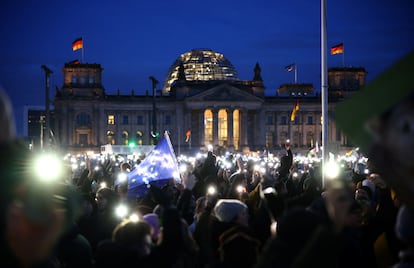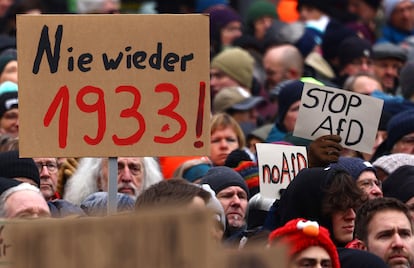Massive demonstrations against the far-right in Germany fuel debate about banning the AfD
Opposition to this extremist political party — which is now second in the polls — has increased. However, there are doubts about whether making it illegal would be counterproductive


Germans are taking to the streets en masse to stand up to the far-right. As more and more citizens reject an obscure project of mass deportations of immigrants — something that the far-right party Alternative for Germany (AfD) discussed with known neo-Nazis — a debate is being fueled that resurfaces from time to time: should the country try to outlaw this political group?
The demonstrations — which, this past weekend, numbered more than a million people in different cities across Germany — have given new urgency to the issue. However, the debate actually opened a few weeks ago, when the co-president of the German Social Democratic Party, Saskia Esken, seriously raised the idea of a political ban at the beginning of January. She said that talking about it would at least “shake up the [AfD’s] voters” by making them aware of what kind of party they’re willing to support.
Concerns about the rise of the AfD are growing as its popularity rises in polls. Radicalism within the bloc is becoming evident. The party is already polling in second-place at the national level (the next federal election is scheduled for 2025) and all polls indicate that, in the regional elections coming September — in Saxony, Thuringia and Brandenburg, three federated states in the territory that was once East Germany — the AfD would take first place and more than 30% of the vote. More and more politicians are wondering if making the organization illegal — or, at least, trying to — could stop a rise that, at the moment, seems unstoppable.

As in any good debate, there are solid arguments for and against. Many Germans also wonder if the legal battle wouldn’t simply end up further fueling a party that takes advantage of the slightest setback to present themselves as victims of a system that’s attempting to silence them. The AfD’s leaders have already been alleging that the political establishment will resort to making their party illegal out of desperation, because the traditional parties are afraid that they cannot win at the polls.
“It’s difficult to know whether it would work or be counterproductive, but we have these instruments precisely to prevent a resurgence of fascism in Germany,” says Alice Blum, an expert in extremism at the IU University of Applied Sciences in Erfurt. “On the one hand, a ban wouldn’t make people’s mindset disappear. On the other hand, it would be necessary to analyze if, by being in the government, [the AfD] can endanger democracy. I think the attempted ban is entirely appropriate,” she adds.
In the debate — as in so many others in German politics — the country’s Nazi past creeps in. Adolf Hitler didn’t stage a coup d’état; he won over the Germans at the polls. The founder of the Forsa Institute for Social Research and Statistical Analysis, Manfred Güllner, makes a comparison that he himself describes as “terrifying.” According to his firm’s surveys, the current support for the AfD is higher than that of Hitler’s party in the early 1930s. “In the Reichstag elections of 1930, exactly 15% voted for the NSDAP (the National Socialist party), which, until then, had only been elected by a small minority of 2% of all eligible voters in the previous elections,” he writes in his newsletter. Two years later, the Nazis were already at 30%.
The memory of those events — which led to the seizure of power by the Nazis in 1933, with Hitler being appointed chancellor — makes many political leaders consider it almost obligatory to try to outlaw the AfD, which they see as an extremely dangerous force against German democracy. As if there weren’t enough signs of the AfD’s radicalization, the secret services of three federal states have formally classified it as an “extremist” organization. One of its leaders will sit in the dock for using a Nazi slogan, while its youth league is also under surveillance, considered to be “a danger to democracy.” The recent investigation conducted by Correctiv — a nonprofit German newsroom — about the AfD’s meetings that discuss mass deportations has opened up a spigot.
The dangerous concept of “remigration”
This publication revealed a secret meeting in a Potsdam hotel between relevant AfD members and known neo-Nazis, in which they discussed a “master plan” to deport millions of people of immigrant descent. This included German citizens who “aren’t integrated.”
The news about that meeting — which was also attended by two members of the CDU (Angela Merkel’s party) from its most right-wing faction (the so-called “Union of Values”) — has brought to the fore the concept of “remigration.” A few days ago, this word was voted as “the worst expression of the year 2023″ in Germany.
Originally, it’s a word that describes migratory movements from the perspective of social sciences (return emigration, the return to the country of origin from which one originally emigrated). But the extreme-right doesn’t use it that way. Rather, they use it “as a term of struggle for their political agenda,” Blum explains. “They use remigration — which, at first, sounds harmless — to disguise their völkisch (ethno-nationalist) fantasies of wanting to deport masses of people from Germany. There are plans for an Aryan and ethnic Germany that [question] our Constitution; they seek to abolish this state as it currently exists,” she emphasizes.
Chancellor Olaf Scholz — of the Social Democratic Party — called the “remigration plans” of right-wing extremists “diabolical” in a video message this past Saturday, while thanking the “tens of thousands of people” who were demonstrating their commitment to democracy in the streets. The AfD has been using the expression for years without fully clarifying what it means, but the Potsdam meeting lit the fuse. “The meeting has brought back the memory of the Wannsee Conference to many Germans. [This was when], in 1942, senior officials of the government of Nazi Germany and leaders of the SS met to decide on the Final Solution to put an end to the Jewish question,” recalls sociologist Céline Teney, a professor at the Free University of Berlin.
In this context of public outcry, left-wing politicians are the most determined to take the path of attempting to ban the AfD. Vice-Chancellor of Economy and Climate Robert Habeck — of the Green Party — sees it as a possibility. “We have to gather evidence,” he said a few days ago. Among conservatives, there are different opinions. Hendrick Wüst (CDU) — the president of the most populous state, North Rhine-Westphalia — has called the AfD an “extremely dangerous Nazi party.” However, CDU leader Friedrich Merz doesn’t agree with this approach. He believes that, if you want to win back your voters — of whom he says the majority aren’t Nazis, but are rather just disenchanted — you have to avoid insulting them. Sahra Wagenknecht — the former MP for The Left, who has just founded her own populist party to win voters over from the AfD — believes that “it would be dangerous for democracy” to try to ban them.
Outlawing the AfD is technically possible, but very difficult. Such a ban hasn’t happened since 1956, when the German Communist Party (KPD) was banned in West Germany. The Constitutional Court has decided on two occasions whether the NPD — the far-right heir to National Socialism — should be banned. In 2017, the judicial body determined that — despite the existence of criminal elements — it wasn’t in a position to influence German parliamentary life.
The request for making the AfD illegal can be presented by the government and the two chambers of the Bundestag. At the moment, a decision hasn’t been made on the matter.
Sign up for our weekly newsletter to get more English-language news coverage from EL PAÍS USA Edition
Tu suscripción se está usando en otro dispositivo
¿Quieres añadir otro usuario a tu suscripción?
Si continúas leyendo en este dispositivo, no se podrá leer en el otro.
FlechaTu suscripción se está usando en otro dispositivo y solo puedes acceder a EL PAÍS desde un dispositivo a la vez.
Si quieres compartir tu cuenta, cambia tu suscripción a la modalidad Premium, así podrás añadir otro usuario. Cada uno accederá con su propia cuenta de email, lo que os permitirá personalizar vuestra experiencia en EL PAÍS.
¿Tienes una suscripción de empresa? Accede aquí para contratar más cuentas.
En el caso de no saber quién está usando tu cuenta, te recomendamos cambiar tu contraseña aquí.
Si decides continuar compartiendo tu cuenta, este mensaje se mostrará en tu dispositivo y en el de la otra persona que está usando tu cuenta de forma indefinida, afectando a tu experiencia de lectura. Puedes consultar aquí los términos y condiciones de la suscripción digital.








































